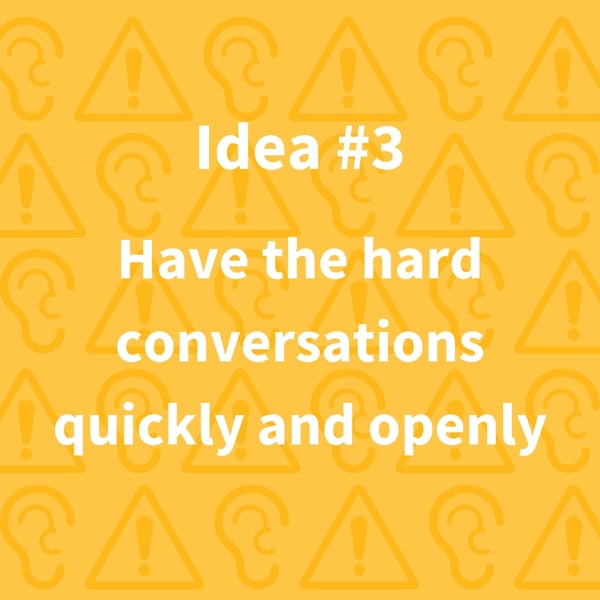This blog post is the third in a series where we're exploring the four points I shared in an article titled "Beware of hearing what you want to hear". Though the original article is about my experiences at Veracity, I hope you'll find some useful ideas you can utilize in your own projects and relationships.
Four ideas that I've found to be important as we help clients execute on their digital transformation projects are:
- Clarify expectations, speak them back, rinse and repeat
- Define the roles that are needed to do the work, and then agree on who is doing them
- Have the hard conversations quickly and openly
- Don't give up too soon, stay the course
Last time I dug into Idea #2 Define the roles that are needed to do the work, and then agree on who is doing them.
This time we'll be focusing on Idea #3:
Have the hard conversations quickly and openly
 After a challenging interaction with a client or team member, I've been known to sarcastically say to my co-workers something like: "If it weren't for people, this job would be great!" Of course, we all know that isn’t true.
After a challenging interaction with a client or team member, I've been known to sarcastically say to my co-workers something like: "If it weren't for people, this job would be great!" Of course, we all know that isn’t true.
I think the last couple of years of enduring a pandemic have shown most of us just how much we crave personal interaction.
Relationships take work, but they are the most rewarding parts of life.
.png?width=600&name=Beware%20of%20Hearing%20What%20You%20Want%20to%20Hear%20Ideas%20(2).png)
Nonetheless, we've all experienced those moments in life when an interaction gets uncomfortable, and we are faced with having a difficult or uncomfortable conversation with another human being.
A client is unhappy because they feel like you haven't met their expectations…
A friend whom you trusted has done something that is hurtful and seems to break trust...
A team member is behaving in a way that is harmful to the team…
An employee is consistently missing deadlines and underperforming…
A member of the client's team seems to be working against progress and even trying to sabotage success…
Your manager seems to be giving you mixed signals and you can't figure out if you are succeeding or failing…
A person you care about is exhibiting self-destructive behavior but denies that anything is wrong…
You've probably experienced a few of these scenarios in your life. I’m sure you could add more to this list.
As we go through life it is inevitable that we will experience the need to have conversations that are challenging, ambiguous, and risky. Yet the outcomes of these interactions will often be of the utmost importance. Sometimes it may seem that the success or failure of relationships, projects, and even lives will be determined by our effectiveness at communicating. Talk about high stakes.
When we are faced with the need to have difficult conversations we feel the weight. It triggers the fight, flight, or fawn emotional responses like fear, avoidance, nervousness, and confusion. Even now, as I write these words, I can think of several real scenarios in my life and can feel the tension rise in my mind and body.
Yet, we must find ways to move forward in these relationships. Inaction will mean that projects, careers, and lives will be stuck in a state of dysfunction and may even experience catastrophic consequences.
In the intro to his book titled Leading With Emotional Courage, leading executive coach Peter Bregman says:
"What's hard – what actually derails us from acting powerfully in our lives, in our relationships, at work, in the world – is discomfort. The discomfort of follow-through. On the surface, it seems like the key to follow-through is the courage to act. And it is. But what underlies the courage to act? The courage to feel. Emotional courage.
…If you are willing to feel everything, you can do anything."
-Bregman, Peter. Leading With Emotional Courage.
Peter proposes four elements to move forward in these challenging interactions:
- Build your confidence, by knowing who you are and who you want to be
- Connect with others by being curious, clear, and trustworthy
- Commit to a larger purpose to energize yourself and others
- Feel courageously and then act boldly
You can read more about these ideas in Peter's Harvard Business Review post "Great Leaders Are Confident, Connected, Committed, and Courageous" and by digging into his book Leading With Emotional Courage.
Peter's books and coaching have been very impactful in my life. Wrestling with this concept of "Emotional Courage" has helped me to move into the scary unknown of hard conversations. I still experience the emotions rising within me, but I've been learning how to keep moving forward, with emotional courage, into the important interactions that change relationships. Here are some things that I try to keep in mind:
- Sooner is almost always better.
- I know that I will try to procrastinate and avoid difficult interactions. If emotions are high then it might be good to wait a day or more for folks to cool down, but waiting too long will often allow emotions to fester. Don't wait too long.
- It is critical for me to thoughtfully prepare ahead of time.
- If I enter a difficult conversation in a casual manner then it usually doesn't go well. In certain situations, I have found that role-playing with a trusted friend can help me think through things and even soften my anxious emotions.
- I need to think about what success looks like.
- What would be the best outcome? What might be a couple of other good outcomes?
- I need to commit to say the hard things.
- I know that in the heat of the moment I will often try to compromise and skip the hard parts. However, it is imperative that I say what needs to be said, with honesty and clarity, even when it is uncomfortable.
- I need to be clear yet concise.
- Once I cross the threshold of the initial words it is easy for me to begin to ramble, especially when I'm nervous. I need to be intentional about saying the first important points and then stopping for a response.
- Once I've said my piece I need to pause.
- A friend once recommended that I count to 10 in my head to make sure the other person has time to thoughtfully respond. This wait can be excruciating. However, it seems like most folks begin saying something by the time I get to 7 or 8.
- I need to remember that the other person has autonomy and I can't control their response.
- This is very important. They have free will and the right to choose whether to respond in a positive manner. If I don't remember this, then they may feel like I'm trying to manipulate them.
There are a number of other good resources available on this topic. In a previous post, I mentioned the book Rapport: The Four Ways to Read People by Emily and Laurence Alison. I also recommend Crucial Conversations: Tools for Talking When Stakes Are High by Ron McMillan and Al Switzler.
At the end of the day, hard conversations will always be hard. Having them will always take emotional courage. However, I have found that the results are worth the risk. I have seen stalled projects reclaimed for success, angry clients turned into trusted partners, and even broken family relationships restored.
So, assuming we have listened well to clarify expectations, aligned on the roles on our team, and are having the hard conversations… then things will work out, right?
Well, of course, success isn't guaranteed. In fact, it often seems to take longer than we expect.
That leads us to Idea #4 in my list:
Idea #4 - Don't give up too soon, stay the course
If you've made it this far, thanks for reading this series and I hope you're finding some helpful thoughts. Don't give up yet. Stay the course. But we'll cover that next time.

 After a challenging interaction with a client or team member, I've been known to sarcastically say to my co-workers something like: "If it weren't for people, this job would be great!" Of course, we all know that isn’t true.
After a challenging interaction with a client or team member, I've been known to sarcastically say to my co-workers something like: "If it weren't for people, this job would be great!" Of course, we all know that isn’t true..png?width=600&name=Beware%20of%20Hearing%20What%20You%20Want%20to%20Hear%20Ideas%20(2).png)
